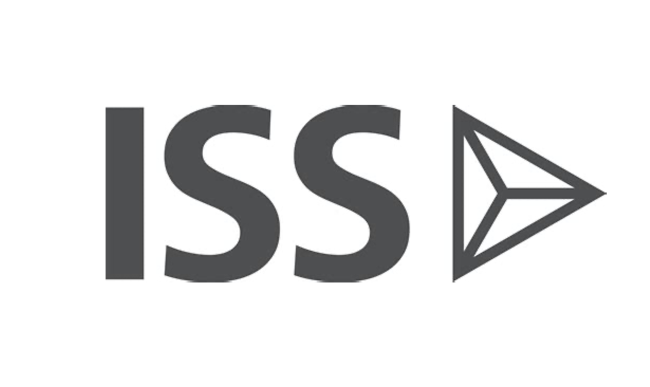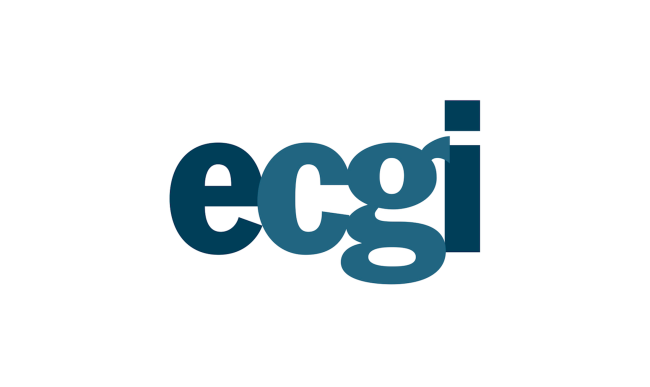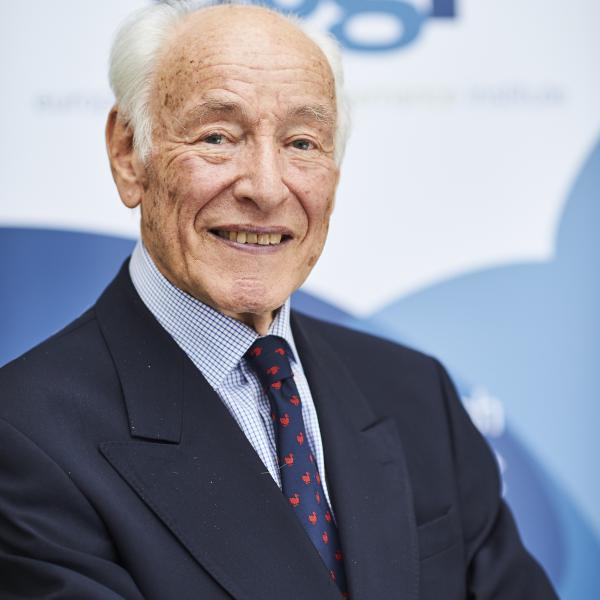One Share One Vote
ECGI, together with Institutional Shareholder Services (ISS), and Shearman & Sterling LLP submitted the results of a Study on proportionality between ownership and control in EU listed companies to European Commission in 2007.

The study found no theoretical or empirical basis for encouraging or discouraging control enhancing mechanisms in general. Regulation must take into account the specific circumstances in which a CEM is or might be used.
On 4 June 2007, The European Commission published an external study on the question of proportionality between ownership and control in EU listed companies. The study found that, on the basis of the academic research available, there was no conclusive evidence of a causal link between deviations from the proportionality principle and either the economic performance of listed companies or their governance. However, there was some evidence that investors perceive these mechanisms negatively and consider more transparency would be helpful in making investment decisions. The study was carried out by Institutional Shareholder Services Europe (ISS Europe), the European Corporate Governance Institute (ECGI) and the law firm Shearman & Sterling LLP.
The study provides a useful factual background to the issue of proportionality between capital and control – known as the "one share, one vote" issue. Previously we didn't have a clear picture of how this issue affects European listed companies and whether it has an impact on their economic performance. Now that these facts are on the table we will examine, with an open mind, the question of whether there is a need for Commission action in this field
~ Internal Market and Services Commissioner Charlie McCreevy
All countries allow Control Enhancing Mechanisms (“CEMs”) from a legal point of view and a wide variety of protective mechanisms are available to shareholders in companies featuring CEMs.
Report on the Proportionality Principle in the European Union
18 May 2007
Proportionality Between Ownership and Control in EU Listed Companies: An External Study Commissioned by the European Commission
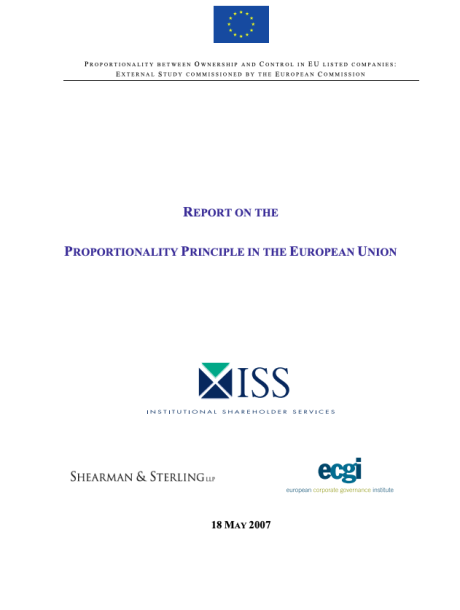
Not all companies use CEMs, even though they might be available. 44% of companies in the sample feature one or more CEM.
In April 2006, the Directorate-General for Internal Market and Services of the European Commission invited tenders (MARKT/2006/15/F) for an external study into the proportionality between ownership and control in EU listed companies. The objectives of this study were:
- to identify existing deviations from the proportionality principle across EU listed companies;
- to analyse the relevant regulatory framework at Member State level;
- to evaluate their economic significance and whether such deviations have an impact on EU financial investors.
The countries with the highest proportion of companies featuring at least one CEM are France, Sweden, Spain, Hungary and Belgium, which all have a majority of companies featuring CEMs.
Background
In its May 2003 Action Plan on Company Law and Corporate Governance, the Commission proposed to carry out a study on the deviations from the principle of proportionality between capital and control existing in the Member States of the European Union. Stakeholders confirmed the need for such a study in their response to the Spring 2006 consultation conducted on the future priorities of the Action Plan.
The study commissioned in September 2006 was led by Institutional Shareholder Services (ISS), associated to a European network of leading academics, the European Corporate Governance Institute (ECGI) and the law firm Shearman & Sterling. The study provides a useful factual background to the issue of proportionality between capital and control, or the "one share, one vote" issue as it is more commonly referred to.
The report is accompanied by detailed surveys of the academic literature and of the empirical evidence on the "one share -one vote " issue as well as by a detailed comparative legal study covering 16 Member States of the European Union as well as Australia, Japan and the US.
Recently listed companies have fewer CEMs than large companies. This means fewer occurrences of CEMs but also fewer combinations of CEMs
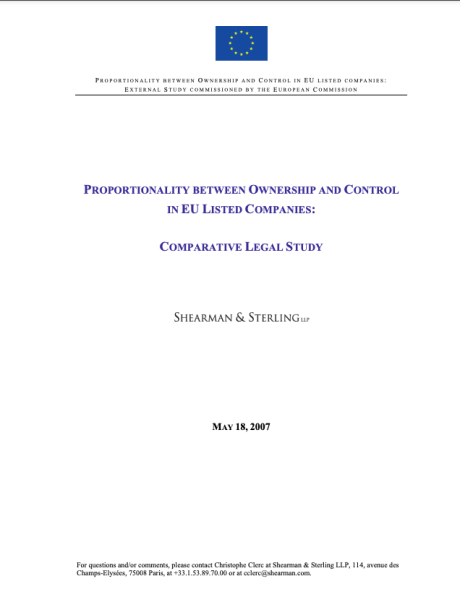
PROPORTIONALITY BETWEEN OWNERSHIP AND CONTROL IN EU LISTED COMPANIES: COMPARATIVE LEGAL STUDY
MAY 18, 2007
Investors say they mostly perceive Control Enhancing Mechanisms negatively. According to most investors, this influences investment decisions. 80% of investors in the sample expect a discount ranging from 10% to 30% of market price.
“For ISS, this Study will have been a success if it contributes to shedding more light on the subject of proportionality and to fostering more transparency in the market place, for the benefits of listed companies as well as shareholders. I’m convinced this objective has been achieved.”
Jean-Nicolas Caprasse, Managing Director of ISS Europe
“The ECGI is very pleased that independent research is having such a significant influence on the governance debate. This study shows CEMs are complex and deserve serious reflection. It is the first step towards systematic stocktaking and evaluation of the proportionality between ownership and control in EU listed companies, based on European data and realities.”
Marco Becht, Executive Director of ECGI
“This is the first time a study surveys the potential availability of Control Enhancing Mechanisms and protective legal devices in nineteen jurisdictions. It shows that a broad range of mechanisms is available in most countries, even when they have different legal traditions. All countries apply the freedom of contract principle to varying degrees.”
Christophe Clerc, European Counsel at Shearman & Sterling.
Institutional Shareholder Services Europe (ISS Europe) is the European wholly-owned subsidiary of Institutional Shareholder Services (ISS), which is the world’s leading provider of proxy voting and corporate governance services with over 20 years of experience. In May 2005, ISS acquired Deminor Rating, a prominent European corporate governance consultancy. ISS Europe served as the main contractor in the tender.
The European Corporate Governance Institute (ECGI) is a recognised international scientific association of over 80 research fellows and associates (2007). Its mission is to improve corporate governance through independent scientific research and related activities. ECGI served as a sub-contractor in the tender.
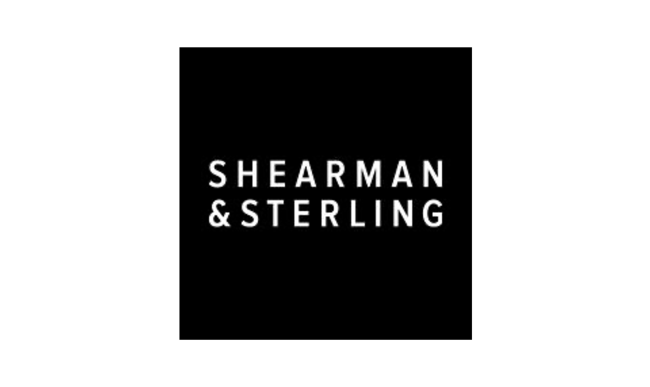
Shearman & Sterling LLP (S&S) is a well-known international law firm with approximately 1,000 lawyers in 19 offices around the world, and more than 300 lawyers across eight offices in Europe (2007). S&S will served as a sub-contractor in the tender.
Frequently asked questions (see also IP/07/751)
Why a study on this subject?
Although the subject is widely discussed in academic and financial circles as well as in the press, there was so far no systematic enquiry into the presence of control-enhancing mechanisms across EU listed companies. The public consultation carried out in spring 2006 by the Commission on the future priorities in company law and corporate governance confirmed that the Commission should look at the question of proportionality between capital and control by commissioning an outside study.
What is this study about?
The main objective of this study was to identify existing deviations from the proportionate allocation of ownership and control across EU listed companies, and to evaluate their economic significance and whether such deviations have an impact on EU financial markets
The aim of the study was to facilitate any Commission evaluation on whether the present regime concerning shareholders' voting rights across the EU is an obstacle for financial market integration in the EU, and whether measures at EU level would, therefore, be appropriate. The contractors were not asked to support any particular policy option for the future.
What is the proportionality principle and which are the deviations?
The concept of the proportionality principle is that shareholders with capital at risk in a company should have a say about the conduct of that company and that that say should be proportionate to the risk they take.
According to the Report of the High Level Group of Company Law Experts of 2002, proportionality between ultimate economic risk and control means that share capital should normally carry control rights, in proportion to the risk carried. The holders of these rights are best equipped to decide on the affairs of the company as the ultimate effects of their decisions will be borne by them.
Common deviations from the principle (so called "control enhancing mechanisms") are essentially the following
- Multiple-voting rights;
- Voting-rights ceilings;
- Ownership ceilings;
- Non-voting shares (be it with or without compensation for the voting right, in particular through a higher dividend);
- Under certain circumstances, other instruments such as non-voting preferential shares and company pyramids.
What about the principle of freedom of contract?
The principle of freedom of contract is based on the premise that corporations have an inherent right to self-organisation and should, therefore, be left with the ability to organise themselves as they see fit. Investors are equally free in their investment decisions and can therefore refrain from investing in companies that are organised in a way that the investor considers inappropriate.
Both principles, the proportionality principle and the principle of freedom of contract, are reflected in Member States' laws. The existing differences derive from the fact that Member States, when balancing the two principles, put the emphasis differently.
Now that this study has been released, what are the next steps?
The study provides a useful factual background. It constitutes an important contribution to the impact assessment that the Commission will carry out. The European Corporate Governance Forum which is a high level body advising the European Commission on corporate governance matters will review the study and its conclusions and may contribute its own recommendations to the process (see http://ec.europa.eu/internal_market/company/ecgforum/index_en.htm).
ECGI Project Team
Empirical survey team:
Professor Renée Adams (Stockholm) and Dr Daniel Ferreira (Lisbon) prepared an empirical literature survey that described the objectives and function of each deviation from the proportionality principle identified in Part A of the deliverables from an empirical point of view. The team reviewed the existing research and literature as to whether there are any indications that deviations from the proportionality principle are statistically relevant related to the performance of companies. They reviewed the empirical literature for the United States, Brazil, Australia and – drawing on the correspondent network – for selected other non-EU jurisdictions.
Scientific Committee
The work of the drafting teams and the networks was overseen by a scientific committee composed of Professors Colin Mayer (Economics and Finance, Oxford), Julian Franks (Accounting and Finance, London Business School) and Joe McCahery (Law, Amsterdam).
Theory survey team:
Professor Mike Burkart (Stockholm) and then doctoral candidate Samuel Lee (Stockholm) described the objectives and functions of deviations from the proportionality principle from a theoretical point of view.
ECGI team co-ordination
The general coordination of ECGI’s contribution was ensured by ECGI’s Executive Director, Marco Becht (Economics and Finance, ECARES, Université Libre de Bruxelles). Professor Becht was also a member of the scientific committee.
Legal scholar network:
ECGI also supported the work of ISS and, in particular, S&S through a legal scholar network. The network was led by Luca Enriques (Bologna University). Professor Enriques coordinated the input of the legal scholar network to the list of deviations from the proportionality principles, the description of the regulatory framework and the comparison with the situation in key jurisdictions outside the EU. This network ensured independent quality control and provided specific and general comments on the relevant contributions from the ECGI, ISS and S&S teams.
Independent review
The ECGI teams’ work was subject to a general review by a non-academic, independent board member of the ECGI, Leo Goldschmidt (former Managing Partner, Banque Degroof).





